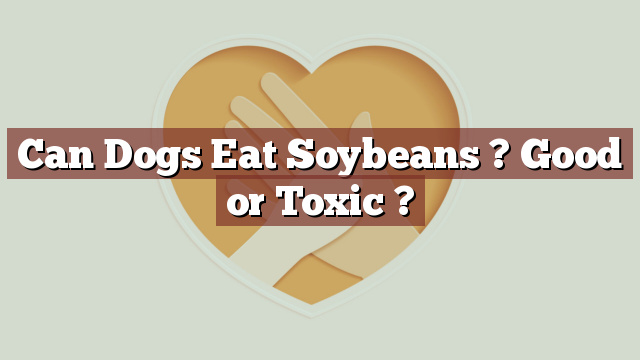Can Dogs Eat Soybeans? Good or Toxic?
Knowing which foods are safe for our furry friends is essential for their overall health and well-being. While some human foods can be harmful to dogs, others can actually provide nutritional benefits. One such food that often sparks curiosity is soybeans. In this article, we will explore whether dogs can eat soybeans and determine if they are good or toxic for our canine companions.
Nutritional Value of Soybeans for Dogs: High Protein, Fiber, and Healthy Fats
Soybeans are a great source of essential nutrients, making them a popular choice among humans. Likewise, they offer several nutritional benefits for dogs as well. Soybeans are rich in protein, which is vital for muscle growth and repair. Additionally, they contain dietary fiber, promoting healthy digestion and preventing constipation. Furthermore, soybeans are a good source of healthy fats, providing dogs with energy and supporting their skin and coat health.
Can Dogs Eat Soybeans? Exploring Safety and Toxicity Concerns
Yes, dogs can eat soybeans. In fact, soybeans are safe for most dogs when consumed in moderation. However, it is important to note that some dogs may have an allergy or sensitivity to soy products. If your dog experiences any adverse reactions such as itching, gastrointestinal upset, or difficulty breathing after consuming soybeans, it is recommended to consult a veterinarian.
Potential Risks and Benefits of Soybeans in Canine Diets
While soybeans are generally safe for dogs, there are a few factors to consider. Soybeans contain compounds called isoflavones, which act as phytoestrogens. These compounds can potentially disrupt hormonal balance in dogs, especially if consumed in large quantities over an extended period. It is advisable to feed soybeans to dogs in moderation, particularly if they have a history of hormone-related conditions such as thyroid problems or reproductive disorders.
On the other hand, soybeans can offer health benefits to dogs. As mentioned earlier, the high protein content in soybeans can contribute to muscle development and repair. Additionally, the fiber content aids in proper digestion and can help regulate bowel movements. The healthy fats found in soybeans also support overall skin and coat health in dogs.
What to Do If Your Dog Eats Soybeans: Monitoring and Preventive Measures
If your dog accidentally consumes a few soybeans, there is usually no cause for concern. However, it is important to monitor your dog for any signs of an adverse reaction. Symptoms such as vomiting, diarrhea, or excessive itching should be promptly reported to a veterinarian. To prevent any potential issues, it is recommended to introduce soybeans gradually into your dog’s diet and observe their response.
Conclusion: Moderation and Vet Consultation Key for Soybean Consumption
In conclusion, soybeans can be a beneficial addition to a dog’s diet, thanks to their high protein, fiber, and healthy fat content. However, it is crucial to feed soybeans to dogs in moderation and monitor for any adverse reactions. If you have any concerns or if your dog has a pre-existing health condition, it is always best to consult with a veterinarian before introducing soybeans or any new food into their diet. By taking these precautions, you can ensure that your furry friend can safely enjoy the nutritional benefits of soybeans.
Thank you for investing your time in exploring [page_title] on Can-Eat.org. Our goal is to provide readers like you with thorough and reliable information about various dietary topics. Each article, including [page_title], stems from diligent research and a passion for understanding the nuances of our food choices. We believe that knowledge is a vital step towards making informed and healthy decisions. However, while "[page_title]" sheds light on its specific topic, it's crucial to remember that everyone's body reacts differently to foods and dietary changes. What might be beneficial for one person could have different effects on another. Before you consider integrating suggestions or insights from "[page_title]" into your diet, it's always wise to consult with a nutritionist or healthcare professional. Their specialized knowledge ensures that you're making choices best suited to your individual health needs. As you navigate [page_title], be mindful of potential allergies, intolerances, or unique dietary requirements you may have. No singular article can capture the vast diversity of human health, and individualized guidance is invaluable. The content provided in [page_title] serves as a general guide. It is not, by any means, a substitute for personalized medical or nutritional advice. Your health should always be the top priority, and professional guidance is the best path forward. In your journey towards a balanced and nutritious lifestyle, we hope that [page_title] serves as a helpful stepping stone. Remember, informed decisions lead to healthier outcomes. Thank you for trusting Can-Eat.org. Continue exploring, learning, and prioritizing your health. Cheers to a well-informed and healthier future!

